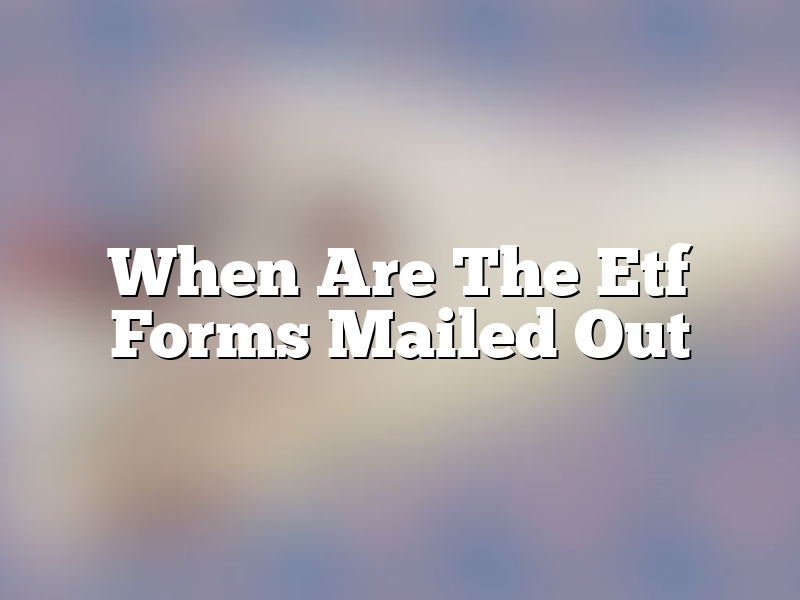When Are The Etf Forms Mailed Out
The ETF Form is mailed out to the taxpayer by the IRS in January. The form is used to report the transactions and income from the previous year. The form is also used to report the gains and losses from the sale of stocks and mutual funds.
Contents
How do I get an ETF statement?
An ETF statement is a document that shows the performance and holdings of an exchange traded fund. ETFs are investment funds that are traded on stock exchanges, much like individual stocks. An ETF statement is a snapshot of the fund’s performance and holdings at a specific point in time.
The statement will show the fund’s name, ticker symbol, and description. It will also list the date, time, and price of the most recent trade. The statement will also show the fund’s net asset value, or NAV. The NAV is the total value of the fund’s assets, minus its liabilities.
The statement will also list the fund’s holdings. The holdings will list the ticker symbol, name, and description of the security. The statement will also show the quantity and percentage of the fund’s holdings.
To get an ETF statement, you can contact the fund’s sponsor or visit the fund’s website.
Is the Wisconsin Retirement System a pension?
The Wisconsin Retirement System (WRS) is a state-administered retirement system that provides retirement, death, and disability benefits to eligible state and local government employees in Wisconsin. The WRS is not a pension system.
Do ETFs have termination dates?
Do ETFs have termination dates?
This is a question that investors often ask, and the answer is that it depends on the ETF. Some ETFs do have termination dates, while others do not.
One reason why an ETF might have a termination date is if the fund is closed to new investors. This can happen if the ETF becomes too popular and the fund manager is unable to handle the influx of new investors. In this case, the ETF will have a termination date that is set by the fund manager.
Another reason why an ETF might have a termination date is if the fund is getting ready to liquidate. This can happen if the fund is no longer profitable or if the fund manager decides to close the fund. In this case, the termination date will be set by the fund manager and it will usually be announced ahead of time.
If an ETF does not have a termination date, it will continue to exist until it is liquidated. This can happen if the fund becomes unprofitable or if the fund manager decides to close the fund.
So, the answer to the question of whether or not ETFs have termination dates is that it depends on the ETF. Some ETFs do have termination dates, while others do not.
How do I contact an ETF?
When you need to contact an ETF, there are a few ways you can do so. The easiest way is to go to the ETF website and find the contact information there. You can also find contact information in the fund’s prospectus.
If you’re looking to speak with a representative, you can call the customer service number. You can also send an email or a letter. If you’re looking to redeem or exchange your shares, you’ll need to fill out and send in a form.
No matter how you choose to contact the ETF, be sure to have the ticker symbol and the number of shares you own ready. This will make it easier for the representative to help you.
Do I need to pay taxes on ETFs?
Yes, you do need to pay taxes on ETFs. The good news is that, in most cases, the taxes you pay on ETFs will be relatively low.
ETFs are a type of investment vehicle that are made up of a basket of assets. When you invest in an ETF, you are buying a share of that basket. This means that you will be subject to capital gains taxes when the ETF sells any of its assets.
The good news is that, in most cases, the taxes you pay on ETFs will be relatively low. This is because ETFs are not as actively traded as other types of investments, and because they often have low turnover rates.
However, there are a few things to keep in mind when it comes to taxes and ETFs. For example, if you hold an ETF in a non-registered account, you will be subject to taxes on any dividends that the ETF pays out. In addition, you may be subject to taxes on any capital gains that you realize when you sell your ETF.
It is important to consult with a tax professional to determine how taxes will affect your ETF investments. By understanding the tax implications of ETFs, you can make smart choices about how to invest your money.
Do you pay taxes on ETF if you don’t sell?
There is no definitive answer when it comes to taxes and ETFs. The answer may depend on the type of ETF and the country in which it is purchased.
Generally, when an investor buys an ETF, they will be taxed on any capital gains realized when the ETF is sold. However, some countries may tax ETFs even if they are not sold. For example, in Canada, ETFs are considered taxable income even if they are not sold. This means that investors in Canada must pay taxes on any dividends or interest earned from ETFs, even if the ETF is not sold.
It is important to consult a tax professional to determine the tax implications of owning ETFs in your specific country.
How many years does it take to be vested in the Wisconsin retirement system?
In order to be vested in Wisconsin’s retirement system, employees must have at least five years of credited service.






0